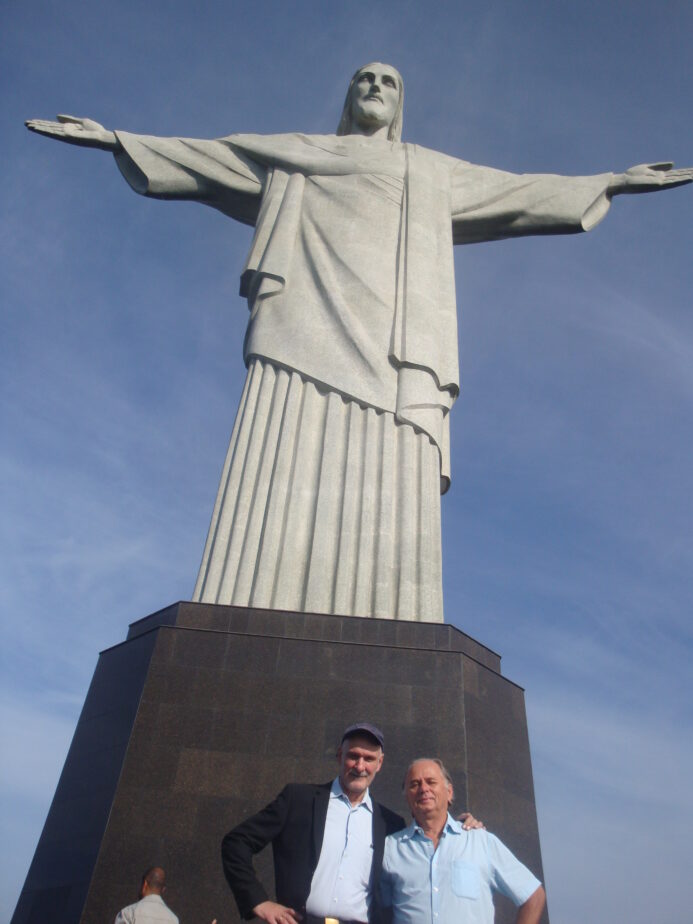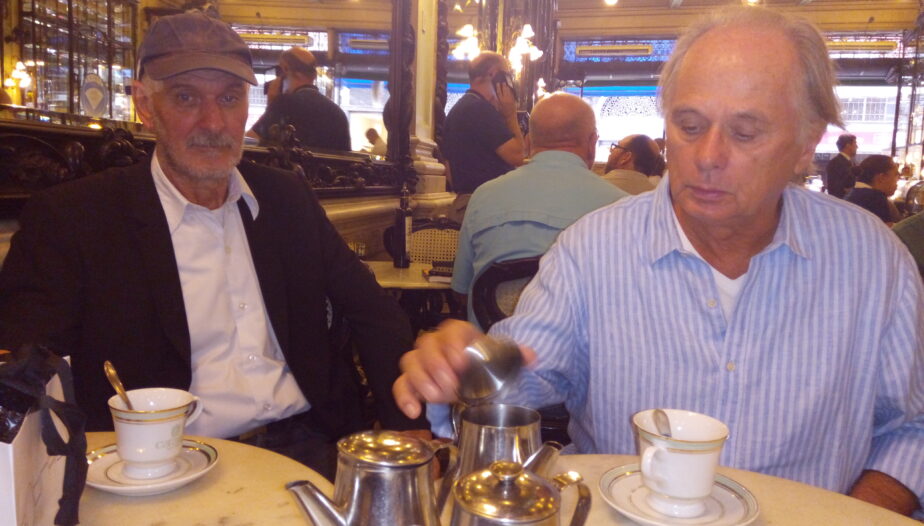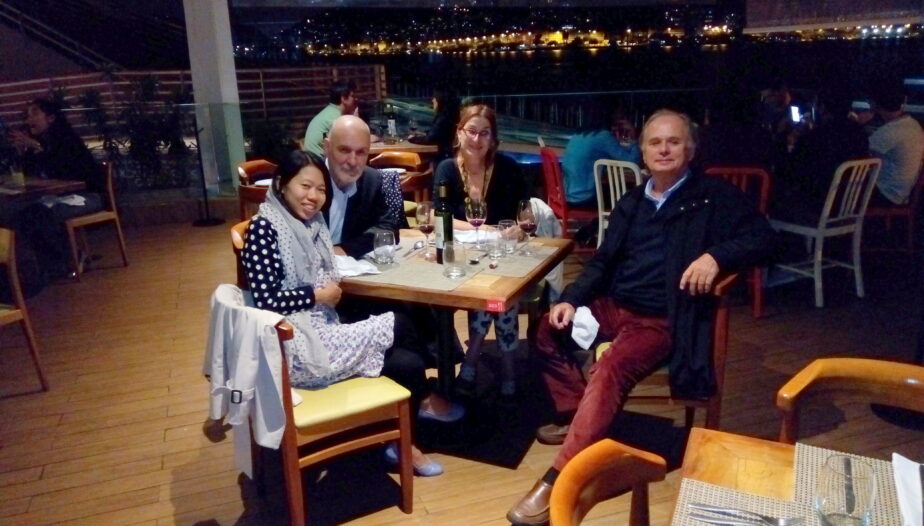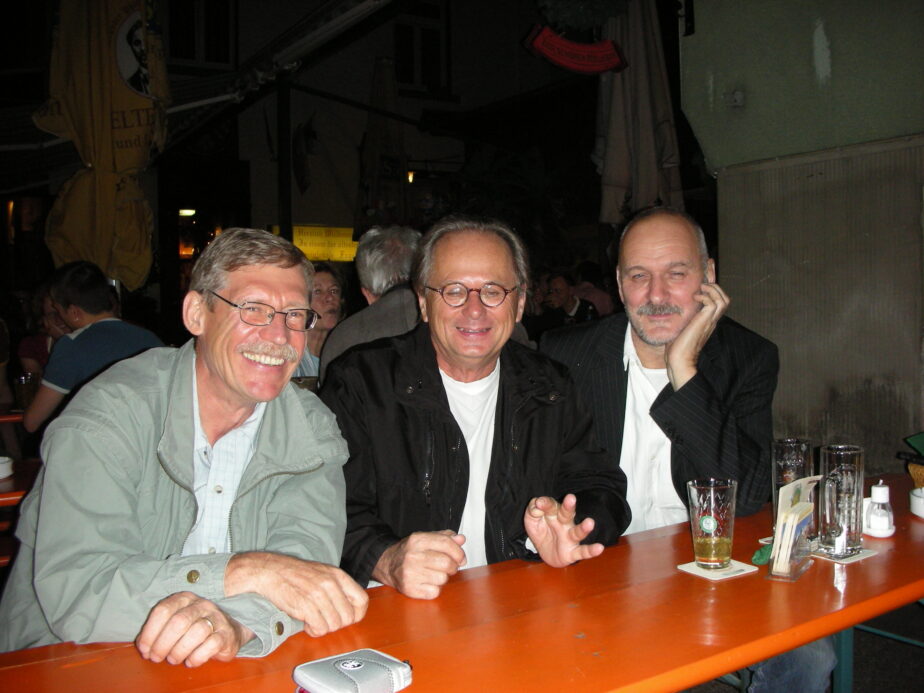The story of Heini Afghan
When a white ship sails to Hong Kong, I am craving for far-off shores.
But when I’m there,I’m craving for my home. And I’m telling wind and waves:
I’ll happily exchange those far-off shores for a trip back home.
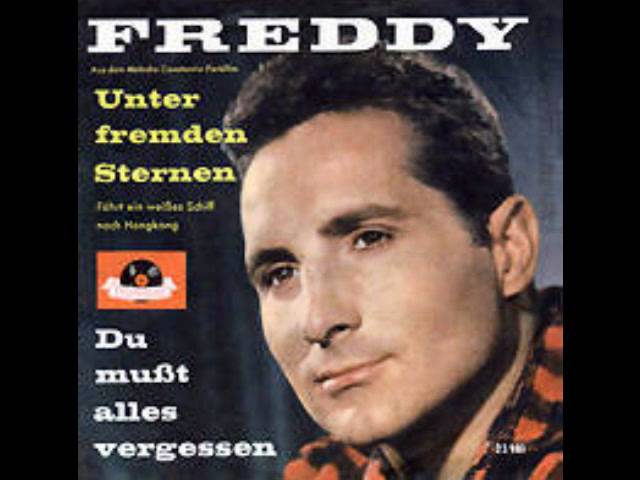
Such were the songs that my father listened to on his record player when I was a child. And it affected me, too! While working hard to build the ‘Wirtschaftswunder’ (Germany’s ‘economic miracle’ after WWII) everybody in Germany seemed to be dreaming of tropical shores. However, for me Hong Kong was about as accessible as the moon. That changed when I left my hometown by the sea and moved to West-Berlin. There I met people who had actually been to Asia. My friend Heini Afghan was the one who narrated the most impressive stories. And here’s the story of his beginnings as he told it to me 35 years later during a visit to Myanmar.
‘I was born in Lünen/Westphalia in 1948. After completing elementary school (1963) I began an apprenticeship as an electrician at the ‘Gneisenau’ colliery in Dortmund and received my apprenticeship certificate in September 1966. I worked another six months as a journeyman and then had savings of 2500 Deutschmarks (those days around 625 US $). In April 1967 I set out for Sweden. It was there that I first came into contact with hashish. German loafers let me take a puff from their chillum – and I was thrilled. Then I took the ferry to Helsinki and I spent the entire summer in Finland. When it started to get cold in September, I headed back for Germany. In Stockholm I got a lift to Hanover with a Citroen 2 CV. A Turkish guy in a Ford Transit gave me the next one. After half an hour he wanted to know if I had a driver’s licence. When I affirmed that, he asked me if I could drive the car to Ankara.
He told me that he didn’t have a licence himself, therefore he only wanted to drive in Germany (!). I agreed and so I wound up in Turkey’s capital. Which wasn’t exactly the place I wanted to be in. So I hitchhiked back to Istanbul. There I found shelter in the Gülhane Hotel and slept on the roof with international travellers for one Deutschmark. The tales of their trip to the East turned me on and I decided to hit the road. Shortly after Istanbul I stumbled across a motorcade of Persians who were taking twelve cars to Tehran. I saw a good opportunity to get there cheaply and agreed to join them. The car was entered in my passport and sold upon arrival. After getting my money I booked a train to Mashhad. From there I continued to Herat/Afghanistan by minibus. At the Afghan border post Islam Qala customs officers were smoking pot and they invited us to have a puff from their hookah. Skipping Kandahar, I went
straight to Kabul where I stayed at the Hotel Noor (near Chicken Street). The prices for dope in Kabul beat anything I’d seen before. A kilo of top quality hashish cost 50 DM! In Germany it would yield a whopping 2,500 DM! Together with a buddy whom I had met on the road I bought 4 kg. We stowed our treasures in a specially made plastic vest. Then all my savings were gone. So we went to the German embassy to get money for the return trip. They confiscated my passport and issued me a provisional travel document for my return journey to Germany. In addition, they gave us 150 DM for the bus fare to Tehran. There we went to the German embassy again, and got the dough for the trip to Istanbul. Of course, we hitchhiked the entire route. In Erzurum we stayed at the police station – with the dope on our bodies. In Istanbul we booked a ride on the Orient Express to Munich. In December 1967 I was back in Lünen trying to sell the dope.
Since no one there seemed to know anything about it, I had to do some market research first. Eventually, I got a hint that hookers and pimps might be inter-ested. I managed to arrange a meeting with one of them and gave him a few grams for sampling. He offered me DM 4,500 for almost 2 kg. We arranged a meeting in the town hall café of a town not far away from my hometown, where the handover was to take place – in the restroom. To be on the safe side, I had brought a sheath knife. Just as we were closing our deal, the door flew open. Four cops from the Dortmund gambling department stormed in and pinned me to the wall. My knife fell to the ground. They arrested and handcuffed me. The alleged buyer had cooperated with the police! He feigned a heart attack and was taken to the hospital. Then they took me to the police station. I admitted everything and was brought to the police headquarters. According to their information my dope was the largest amount of hash confiscated in the
West German state of North Rhine Westphalia up to that day. Luckily, I was considered a lost soul and they treated me kindly and considerately. I spent a night in jail and was taken to a juvenile court. They ordered that my detention was to be continued. I was taken to the juvenile detention centre where I met prisoners as young as fourteen. Some of the guards were really sadistic, I had to polish the floor constantly. After eight days, I was released. My parents picked me up and took me home. I was told to look for a job and to report to the Lünen police station once a week. I found work quickly and was sentenced to four weeks in prison in April ’68. In order to avoid losing my new found job, the sentence was commuted to four weekend detentions. I served that sentence in a basement cell in the district court. I remember that the warder was really nice and his wife even brought me sandwiches.
But the travel bug had seized me. In November ’68 I set off again for Istanbul in a Mercedes 180 Diesel with a friend and a girl we knew. We spent Christmas on the Bosphorus and then we drove towards Iran. In Kermanshah we applied for visa for Iraq. The Ba’ath Party had just taken power there at the time. We drove towards Baghdad, but unfortunately our car breathed its last shortly after crossing the border. We parked the Daimler at the customs yard and gave it to the Red Crescent as a present. Then on to Baghdad where we stayed for a few days. From there to Basra, where we applied for a Kuwait visa. We had heard that there they paid 120 DM for a blood donation. A multiple of what they paid Persia! We also hoped for a job as record sellers or something similar. The blood donation thing actually worked; we were told that the blood would go to the fighting Palestinian people. After three days the money was gone and we went to the blood donation centre again, this time in disguise. But the Kuwaitis smelled the rat and asked us to come back after the protection period. We were constantly invited by some guys, everyone wanted to screw the girl. We met an Iranian with whom we stayed for a week. That man must have been very lonely. The emirate turned out to be too expensive for us and we drove back to Basra and then via the Shatt-el-Arab to Abadan/Iran. We stayed with revolutionary oil workers who wanted to overthrow the Shah. They used broken necks of bottles as chillum. This time we bypassed Afghanistan and took the route through the south of Iran via Quetta to Karachi. From there on via Lahore to India. In spring ‘69 we arrived in Goa via Delhi. We slept under a palm tree on the beach in Calangute and met a lot of hippies from the USA. When it got too hot for us there, we went to Kathmandu, which was where everyone wanted to go. We stayed there until the onset of the monsoon in June. Then overland to Calcutta. We stayed there for quite some time and explored the area.
In September we bought a flight ticket to Bangkok for 64 USD with a one day stopover in Rangoon (the only type of visa available those days). We had been told that there were good jobs waiting for foreigners in Singapore. So we set off and added a Southeast Asia trip (Thailand, Malaysia) along the way. Unfortunately, the hoped-for jobs didn’t exist there and we continued towards Australia. In Jakarta we stayed on Jln. Jaksa, terrible dumps. Then towards Surabaya, where we visited what are said to be the largest brothels in the world – Jarak and Bungungrecho. Truly impressive!
From there we went to Denpasar/Bali by bus, and had a look at Mt. Bromo on the way. In Banjuwangi (Java) we boarded a landing craft to Gilimanuk (Bali). In Denpasar we lived in the city, because in Kuta Beach there were only expensive hotels. So we took a bemo to Kuta for a swim at the beach. Then island hopping to Kupang, and from there by plane to Dili, which was still a Portuguese colony at that time. Another flight took us to Darwin/Australia, where we arrived just before Christmas 1969 with 12 USD to our name. We found a place in a shared flat and spent Christmas and New Year in Darwin. I immediately found a job there as an electrician: High hourly wages, better than in Germany. After half a year we had earned enough money to go back. In June we left for Indonesia, where we wasted our hard earned money. A lot had changed at Kuta Beach, the first losmen had started operations. Kuta had suddenly become affordable. We spent a month in Bali and drove overland to Palembang/Sumatra via Java. We didn’t stay there very long and finally reached Medan via Padang and Bukit Tinggi. We crossed the Malacca Strait to Malaysia and then continued to Thailand. In Bangkok I was in for a happy surprise: I got a check from the Australian embassy – tax refund!
While hanging out in the Far East, I was drafted into the German army without my knowledge. When I didn’t show up, the military police came to my house. They wanted to arrest me, but had without success … My parents informed me in a letter that I was on the ‘wanted’ list now! The German embassy in Bangkok urgently recommended that I return home. So I set off. I flew to Calcutta to apply for a visa to Nepal. The hippies were smoking weed on the consulate’s lawn! On the way back to the hotel, my passport was stolen. I applied for a new passport at the German consulate, but my application was rejected. I was only given a provisional passport for the overland journey home, limited to four weeks. Bought dope again on the way (hashish and morphine).
In Vienna I got rid of 1.5 kg of hashish in one fell swoop. Suddenly, I had a lot of cash in my hand! And 50 g of morphine still in the sole of my boots! But I was wanted and no longer had a valid passport. So I considered flying directly from Vienna to East Berlin. And then secretly enter West Berlin via the Friedrichstrasse underground station. But the East Germans didn’t want to let me in without a valid passport. So I decided to go back to West Germany. There I wanted to buy a friend’s passport and exchange the picture. Unfortunately, I was arrested at the border after they had a look at the ‘wanted’ list. They took me to a jail in Garmisch-Partenkirchen. There I was told that I
had an arrest warrant out. From there I got to Oldenburg via various prisons. First we went to Munich-Stadelheim (where the guards were called ‘Wachteln’ by the prisoners). Then via Rothenburg, Frankfurt, Kassel, etc. to Bremen. From there finally by collective transport to Oldenburg – the end of a long journey. On the way I had many interesting encounters. Fortunately, the dope in my boots was not discovered. It was in my luggage, which went separately. In Oldenburg I finally got my things handed over in the effects room. I was charged with desertion and sentenced to four months in prison. Which were reduced to two, because I had already served half of it on the way to Oldenburg. After being released, I was taken straight to the barracks in Oldenburg to do my military service. I fled to Lünen that same night. Then on to Hanover, from where I flew to West Berlin*. I found shelter with some buddies from my hometown (Hennes, Tiger, Piet Budde, the most famous of all Lüner guitarists, and others).
*Those days, the western half of the divided town was off limits for the West German army according to the four-power statute. Which meant that young men who were living there, couldn’t be drafted into the army. So West Berlin gained enormous popularity with young Germans.
I hired a lawyer. He pleaded for certifiable insanity and requested a psychiatric I secretly returned to Lünen not much later. Together with a few friends, I founded the ‘Association for the Promotion of Tea Culture’ in Lünen, where we opened a ‘tea room’. It soon had to be closed due to various problems. Supposedly we had no parking space for the shop and the detachment was insanely expensive. Or better: the authorities in my home town didn’t like the stoner scene. So I went back to Berlin where I sold my morphine and lived there for a while. Then I decided that I had to do something about my ‘wanted’ status and turned myself in to the police to put an end to the story. I spent fourteen days in a West Berlin jail and was brought back to Oldenburg via Hanover.
evaluation according to paragraph 51 of the German criminal code. I told the psychiatrist a wild story about obsessions (marching robots, hands coming out of the wall) and my drug use. His report confirmed that I was mentally incapacitated. That got me released.’
Well, I thought to myself in the early 70s: What a story! So it really worked! You didn’t need a lot of money and you didn’t need friends overseas! Just need to go! From then on I harboured the desire to follow in Heini’s footsteps and do the same as him and other friends. But it was to be a few years before I finally hit the road.
And I can’t wait to get on the road again
On the road again
Goin’ places that I’ve never been
Seein’ things that I may never see again
This Willie Nelson song – not to be confused with the Canned Heat song of the same name! – seems to have been Heini’s motto in life. We lost contact in the mid-1970s. From time to time I heard stories about him – it always sounded quite adventurous. After decades of travelling around the world, he finally settled in Brazil, where he bought a hostel at Trancoso Beach. He later started a family in Rio. He also maintained an attic apartment in Frankfurt, where he
occasionally stayed because he valued contact with family and friends in his old homeland. Apart from that, he was still on the road a lot, because the travel bug never really let go of him. He just wanted to see everything. When he came to our wedding in Yangon in 2015 it was straight from North Korea. At the beginning of the third millennium, I suddenly got an email from him: Would I be interested to meet up? We met at Frankfurt airport for a coffee and from then on kept in regular contact. I often visited him in Frankfurt and we made interesting trips to the surrounding area. So the only boat trip on the River Rhine in my life. We sailed from Rüdesheim (where he had married twice!) to St. Goarshausen. On the way, Japanese passengers intoned the song ‘Loreley’! Before that, we visited the Niederwald monument and took the famous gondola no. 76 up. According to rumours the KING (Elvis) himself had travelled in it while shooting ‘G.I. Blues’ in 1960!
La guitarra Brasiliana
‘What dreams are for one man and what money and riches are for others – for me, my Brazilian guitar is my world!’ (La Guitarra Brasiliana, Freddy)
Such was the stuff of which my idea of Brazil in general and Rio in particular was based as a child. As mentioned before, sea shanties took up a lot of space in my father’s record cabinet, above all, of course, those sung by Freddy Quinn. He was the most popular of the homesick singers and even starred in quite a few movies. Among them ‘Weit ist der Weg‘ (So far is the way) which was set in – Brazil!
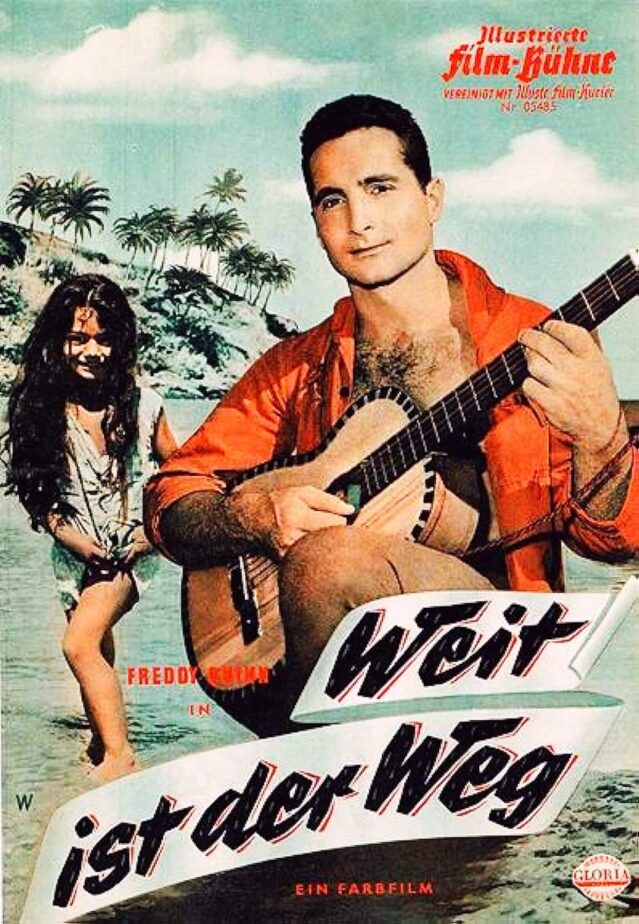
Rio just sounded too exotic! Heini had often invited me. Somehow, however, I always lacked the time – and probably also a little bit of interest! In 2016 (just before the Olympics) I finally made it, together with Ei Ei, my Burmese wife. We flew from Berlin (via Paris!) to Rio where Heini was waiting for us at the airport. The town was a huge construction site – it was a few months before the start of the Summer Olympics. We stayed in his beautiful house in the Gloria district. There he lived with his wife Ligia and their son Leonardo. From their balcony we enjoyed great views over the bay of Rio. Apparently, Gloria is a very hip district, lots of cafes, bars, etc. In an antiques shop I couldn’t believe my ears: A long-forgotten film tune from my childhood was being played there: ‘O Cangaceiro!’ That film was set in Brazil, too! And so I finally found out what cangaceiros are: bandits! Of course we visited Copacabana, Sugar Loaf, Corcovado and other ‘must see’ destinations. He also accompanied us on a trip to Petropolis, residence of the last emperor of Brazil and refuge of the German poet Stefan Zweig, who committed suicide there. At my special request, he included a trip to Peru: since we were in South America, we also wanted to see Cusco and Machu Picchu. Everything went just the way we wanted it! Before we left Rio we made an appointment to meet in Malacca in November 2016. Just a stone’s throw away from Myanmar where I live. Heini and Ligia wanted to make a stop there as part of a planned ‘bucket list’ trip around the world (Rio-Europe-Africa-Southeast Asia-Australia-South Seas-Mexico-Rio). In October 2016 I received an email from my friend ‘Apeman’ Deichert who lived in Ethiopia those days: Heini was dead! I was shocked, he was only 68 years old! He died of heart failure after a trekking tour in a remote area of Ethiopia, no hospital far and wide! His wife, who is a doctor, could not help him either. He probably would have wished it that way … Thus ended the life of an extraordinary man and good friend.
